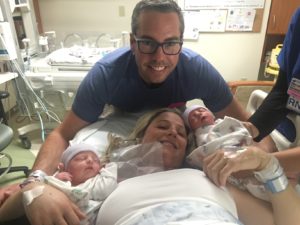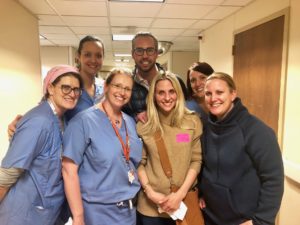When Randi’s labor and delivery took an unexpected turn, she was thankful that she received such capable, compassionate care.

When Randi and her husband, Barclay, were struggling to get pregnant, she made an appointment with Dr. Allison Herman at CU Medicine OB-GYN East Denver (Rocky Mountain) to see what might be impeding their dream of starting a family. Testing soon revealed that the couple’s best chance at conceiving would be in vitro fertilization (IVF).
After undergoing fertility treatment, the couple was thrilled to learn that they were expecting twins. For the first 10 weeks, the pregnancy was carefully monitored by the doctors at the fertility clinic they were using.
“When I found out I was pregnant with twins, people encouraged me to go to a multiple pregnancy specialist,” Randi explains. “But I chose to stay with CU Medicine OB-GYN East Denver (Rocky Mountain) because I loved Dr. Herman so much. Something in me knew that she needed to be my doctor and I needed to deliver at Rose Medical Center.”
Welcome arrivals
Dr. Herman and the team at CU Medicine OB-GYN East Denver (Rocky Mountain) carefully monitored Randi’s health as the pregnancy unfolded. She was diagnosed with gestational diabetes and high blood pressure. She was careful to take the measures needed to control the diabetes and monitor her blood pressure.
“Dr. Herman really pushed me to go the distance with the pregnancy,” Randi adds. “At 32 weeks I wanted nothing more than to deliver these babies, but Dr. Herman pushed me to go the distance.”
At 36 weeks, Randi recalls feeling unwell. She decided to check her blood pressure with the at-home cuff she’d grown accustomed to using.
“It was through the roof,” she recalls. “We called Dr. Dix who was on call at the time, and she said we should get checked out. It was a Saturday night when we checked into Rose, and they said there was an 80 percent chance that we’d deliver that night.”
While Randi did not end up delivering that night, in the morning she was diagnosed with atypical preeclampsia, and was told that she would need to remain in the hospital until the babies were born. The decision was soon made to have a C-section delivery the next day – Monday evening.
She recalls details from that night vividly.
“Dr. Herman came in and she gave me a huge hug. It wasn’t like she was a doctor. It was like she was a friend in that moment. There she introduced me to Dr. Schneider.”
After her C-section delivery, Randi had a brief opportunity to bond with their babies. She held Barclay Jr., named after Randi’s love of her husband’s name, and Sailor, a name that navigated into Randi’s mind with love and adoration. Their dream of a family was now a reality.
“Everything went great – so much so that everyone was high fiving. The babies didn’t even need oxygen. It was like they were healthy singleton pregnancies.”
But then, without warning, things changed.
From high fives to all hands on deck
“In the recovery room, one of the nurses started pushing on my stomach and had a concerned look on her face,” Randi explains. “I could tell something was wrong. I could feel it. I soon learned that I was bleeding out.”
The nurse called Dr. Schneider, and she came rushing back to the hospital.
The team inserted a Bakri balloon, a specially designed device to control postpartum hemorrhaging, and performed a dilation and curettage procedure. Randi’s uterus had been over-stretched from over 12 pounds of babies, two placentas and two amniotic sacs, and she was bleeding profusely as a result.
“Dr. Schneider was fighting to save my uterus,” she explains. “A lot of doctors in this situation would skip that and just take the uterus. I’m so blessed that I was with them.”
Randi stabilized and was moved back to the recovery room. A few hours passed, and the bleeding returned in full force. At 3 a.m. Randi was rushed to the operating room.
“Dr. Schneider was there the entire night by my side with me, along with Kris my nurse,” Randi continues. “They did not leave my side. They were determined. They gave me as much as they had ever given anybody in this situation, and I lost over 4 liters of blood in total. If I hadn’t had those doctors and they hadn’t had those protocols in place, I could have lost my uterus and even lost my life.”
Twelve hours later, Randi’s bleeding finally stopped. It wasn’t long before she reconnected with her twins and returned home a proud mother of two.
Embracing motherhood – with PTSD – and finding hope & healing

While PTSD (posttraumatic stress disorder) is most often associated with veterans returning from war and victims of violent crime, it can, and does, affect thousands of new mothers each year. Randi’s near-death experience left her reliving the events of that night over and over again. She suffered from crippling anxiety, fearing for the safety of her children and struggling to leave the house.
“It actually came to a head at around 10 months,” she explains. “Someone said, ‘I think you might be suffering from PTSD.’ I thought, No, that’s what war veterans suffer from.”
Randi sought care from a psychologist who confirmed her friend’s suspicion. She was indeed suffering from postpartum PTSD. From there, the slow healing journey began. Seeking closure, she requested a time to sit down with Drs. Herman and Schneider to process everything that happened. The doctors were happy to oblige.
“We all sat in the recovery room,” Randi recalls. “I was trembling. I just fell apart. Kris was holding my hand, Dr. Herman was hugging me, and we revisited that night together. We were there for two hours. And Dr. Schneider was there even though it was her day off.”
Reliving the traumatic night with the doctors helped Randi fully explore and experience what had happened to her during the births of her children. For her, it was a pivotal point in her healing process. The PTSD began to ease, she began to heal, and she was overwhelmed with gratitude for the doctors and nurses who cared enough to take the time to support her healing process.
“You feel so broken for so long when you have PTSD. All of those doctors at Rose told me, ‘We are so proud of you. You are such a strong woman.’”
Randi urges women struggling postpartum to seek help.
“PTSD after birth is just as real as other mental health problems like depression and anxiety,” she says. Speak to your doctor. Talk about it. I know if I hadn’t been treated, I don’t know where I’d be.”
That night changed my life forever. And I’m now a better mom than I ever thought I’d be. I almost look at it as a second chance at life because I had a brush with death.”
